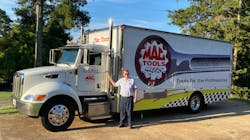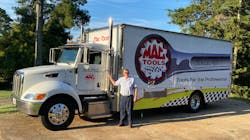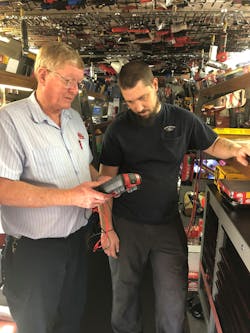Content brought to you by Professional Distributor. To subscribe, click here.
Electric and hybrid vehicles may not be the most common on the road right now, but, with more and more vehicle manufacturers making pledges for fully electric line-ups, that will soon change. As these vehicles become more commonplace, automotive technicians will need the proper tooling and equipment to diagnose and repair them.
Mac Tools distributor, Glen Black, is already starting to see a slight rise in the sale of electric vehicles at the dealerships he visits along his route in Huntsville, Alabama. Though he does admit, that along his variety of stops – dealerships, independent shops, body shops, heavy equipment, and tractor dealerships – there isn’t much demand for hybrid/electric vehicle tools and equipment.
However, after 26 and a half years in the tool-distributing business, Black understands the automotive industry is constantly changing and one must always be prepared for those changes. Black notes that he’s the oldest tool man in this area by a long shot as far as the years he’s been in business, so in his customers’ eyes, they see him as reliable, dependable, someone who will show up every week.
Meaning that when Black had a customer in the market for an advanced digital multimeter – the kind a tech needs for work on electric vehicles – the customer chose to buy from Black as opposed to the other companies he was looking at.
Though many of his stops don’t work on hybrid/electric vehicles, and Black only keeps a small stock of hybrid/electric tools and equipment on his truck. He is prepared to cater to whatever his customers need.
Help your customers prepare
A report from Zutobi, a driving education website, states that it is expected that by 2030 50 percent of all vehicles sold will be electric – only eight years from now. The report also notes that since 2021, the number of EVs in the U.S. has gone from around 543,610 to over a million. That’s an increase of 87.5 percent, and that number will only keep growing.
In order to prepare for the onslaught of EVs coming, shops will need to start purchasing the tools and equipment necessary for diagnosing and repairing these vehicles, meaning they’ll likely be turning to their local mobile tool distributors for help.
Now, you may not be getting questions about hybrid/electric vehicle tools and equipment today or tomorrow or even next month, but they will come eventually, and you’ll want to be able to discuss all the fine details surrounding these investments with your customers.
Return on investment
As with any purchase a shop makes, they’re going to want to consider the return on investment (ROI) and what that looks like before finalizing their purchase. In the case of tools and equipment for hybrid/electric vehicles, shops will want to consider how much of their business comes from working on these vehicles. Is it worthwhile for them to buy this equipment or does it make more sense to send the vehicle over to a dealership? Either scenario could result in the shop losing money.
However, Frank Casale, director of sales and marketing for Flo-Dynamics, points out that, overall, this investment will have to be made eventually. For some shops, it may not make sense for them to buy the equipment now, but for other shops located in areas with high gas prices or with a greater number of hybrid/electric vehicles on the road, this investment may need to be more immediate.
Casale compares this shift away from internal combustion engines to the switch to 1234yf refrigerant. When the refrigerant first came out, it was primarily used by body shops and dealerships, but now you see it throughout the industry at full-service shops, tire places that do A/C work, and so on. Repair work on EVs will likely spread throughout the industry in a similar way.
Another factor to think about when considering ROI is the multipurpose functionality of the tools and equipment.
“Finding tools and equipment that can be used in either ICE or EV/hybrid repairs add the greatest immediate value as the industry transitions to full-electric cars,” notes Justin Fisette, senior product manager at Bosch Automotive Service Solutions.
With tools and equipment such as this, shops won’t have to worry so much about the number of hybrid/electric vehicles they see and may even be able to make a greater profit by having these tools available, so less work needs to be sent off the dealerships.
Training
Training is also an important factor to consider before making any tool or equipment purchases. If a shop’s technicians aren’t trained to work on electric/hybrid vehicles, it doesn’t make much sense to be purchasing any equipment specifically for those vehicles.
To get this training, shops should look into the ASE Light Duty Hybrid/Electric Vehicle Specialist Test (L3) as well as follow all OEM recommended service procedures, Fisette advises. Though EVs and ICE vehicles align in many ways, it is crucial to understand their differences – especially when it comes to EV batteries. Many EVs run on lithium-ion batteries, and technicians should be aware of how to properly lift an EV battery, charge it, how a shop should operate when one is present, and how to safely operate on high-voltage systems.
Without this training, Casale warns that the technicians could not only harm themselves or their coworkers but also potentially damage the building they are working in. Shops must be sure their technicians are fully prepared to handle hybrid/electric vehicle tools and equipment before making these purchases.
Tools to stock
In Black’s opinion, one of the best things a tool distributor can do to make the sale on electric/hybrid vehicle tools is to have them on the truck.
“You can’t sell them if you don’t have them on the truck,” he says.
So, what should you be stocking?
Leak Testers
A leak tester specialized for use on EVs is a tool many shops may not realize they need. Leak testers used on ICE vehicles use smoke or vapor to show technicians where the leak is located, but when using a leak tester on an EV, especially in an EV’s battery compartment, OEs want to ensure the compartment does not get compromised, so a regular leak tester just won’t do, Casale notes.
“[The OEs] don’t want any contaminants in there at all, so they just want clean, fresh air to test it,” Casale says.
Also, Casale advises that the tester should be low pressure, not high, as high pressure could potentially damage the compartment. To meet these requirements, Flo-Dynamics has come out with an EV Battery Pack Leak Tester that is low-pressure, smokeless, and vaporless to provide contamination-free air for testing.
PPE
Gloves are a major part of the necessary personal protective equipment (PPE) technicians should be wearing while working on hybrid/electric vehicles. The gloves should be fully insulated with no cuts or holes. Any damage to the gloves means their protective capabilities are at risk.
In order to check the gloves, many technicians will use a pump to inflate the glove and then dip the glove in water and look for bubbles. The issue with this method, Casale says, is that “now you have a wet glove that has to be dried off…or if you don’t wipe it off at all, the last thing you want to do is have a wet glove working on an electric vehicle.”
Additionally, if the rag used to dry off the glove isn’t clean, then the glove could be contaminated, which could lead to compromising the EV’s battery, so Flo-Dynamics has created another method for checking gloves. Apart from acting as a leak tester, the Flo-Dynamics EV Battery Pack Leak Tester also includes a high-voltage glove adapter for technicians to test their gloves.
Lifts
With the additional weight an EV’s battery brings, shops will want to look into vehicle lifts with higher weight capacities, notes Fisette. This same weight consideration should be applied to other equipment as well, such as lift tables, floor jacks, and stands.
Other tools and equipment
Though many of the same tools and equipment can be used on both ICE vehicles and EVs, Fisette lists a few specifically geared toward EVs that shop owners will need for repair work.
• Insulated hand tools are a must when working with high-voltage systems.
• Multimeters with CAT III ratings up to 1,000V and an insulation resistance test feature.
• Larger C-frames for a ball joint press due to the heavier-duty suspension components in EVs meant to handle the extra weight from the battery.
• An EV charging station, so EVs that come in with little to no charge can be juiced up. Having this could also increase customer satisfaction as they will be getting their vehicle returned fully charged.
How to make the sale
Black’s biggest tip for selling hybrid/electric vehicle tools and equipment is getting to know the right people at the stops you visit. Not every technician is going to be working on EVs or hybrids.
“When you find out who’s certified, you just talk to them and learn what they need, tell them what you’ve got, and go from there,” Black says.
Additionally, both Casale and Fisette stress the importance of giving your customers as much information as possible.
“Highlight the accuracy, longevity, and overall benefits of each product,” Fisette says. “Make sure to explain how each tool adds value by allowing shop owners the ability to better serve their customers.”
Your customers may not be getting much hybrid or EV work right now, but in a few years that could be very different, so start preparing for their questions now and get your truck stocked up.
What are the top five tools you sell?
1. Any kind of cordless tool
2. Rechargeable flashlights/work lights
3. Ratchet wrenches
4. Smaller scanners
5. Code readers
About the Author
Emily Markham
Editor | PTEN and Professional Distributor
Emily Markham is the editor of Professional Tool & Equipment News (PTEN) and Professional Distributor magazines. She has been writing about the automotive aftermarket since 2019, after graduating from UW-La Crosse with a bachelor's degree in English. During her first three years with EndeavorB2B's Vehicle Service & Repair Group, Markham also wrote for Fleet Maintenance magazine.
Don't miss Markham's next article. Sign up for PTEN or Professional Distributor's weekly newsletter.



